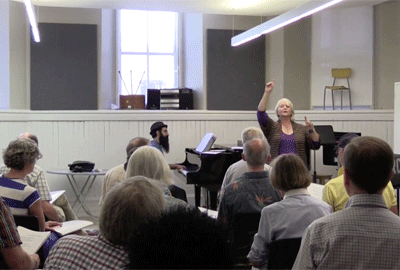Parkinson's choir tests limits of disease

Ever since he was diagnosed with Parkinson's disease in 2010, Darrell Piekarz has experienced a disease that has limited his ability to express emotions, limited his facial mobility and decreased his drive. "You feel like the world is closing in on you, and you can't give in to that," he said. "Medication helps, but it's not the whole solution. It's about motivation."
One place to find that motivation could be music. Piekarz is a member of the Parkinson's choir research project, a collaborative project between Ryerson University and the Royal Conservatory of Music that explores the relationship between singing and mobility.
For 13 weeks, until the end of August, the choir meets every week at the Royal Conservatory of Music to sing classic and contemporary songs expressing happy or sad emotions. Through their performing, the participants mimic the expressions they're singing, while Ryerson researchers test if singing delays the progression of the disease.
"This is kind of an antidote to all that that makes me less expressive – my voice is stronger, my face shows more emotion," said Piekarz.
The experiment is based on a previous study by Ryerson psychology Professor Frank Russo and his researchers, in which people with Parkinson's sang once a week for 13 weeks at the SMART lab. "We found that people's voices were stronger, as measured by the maximum intensity and the pitch range," said Russo. "And maybe more important, their automatic mimicry to emotions was restored, which is the best-case scenario. We weren't expecting to find that."
"We find that when people with Parkinson's hear rhythms, they're able to move a lot more fluidly," said Esztella Vezer, master's clinical psychology student and research leader. "The music sends a message from the brain coming to the muscles of the body in a way that's not interrupted by an area that's been affected by Parkinson's. People can move more fluidly and their tremors seem to disappear."
The choir, which started June 24, meets Wednesdays under the direction of Paula Wolfson, an artist/educator with experience teaching singing to Alzheimer's patients. "This is my first adult group who are fully cognitive, so for me it's a gift, because I can raise my bar a little bit," she said. "Right from the get-go, everyone sounded so great and already had a lot of volume and breath control."
The choir also represents an attempt to conduct research through a more accessible, engaging project, and provide a social space for the participants. Researchers hope that in addition to providing scientific insight, the program could serve as a model for other Parkinson's choirs.
"Singing is a really good solution to wanting to withdraw from the world," said Piekarz. "The brain chemistry doesn't support you being strong and extroverted. Anything that can help you be that – whether it's physiotherapy or tai chi or singing – can contribute to the quality of your life and help the people around you."
Provided by Ryerson University